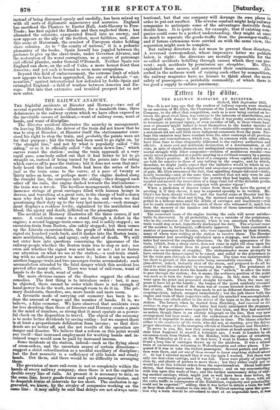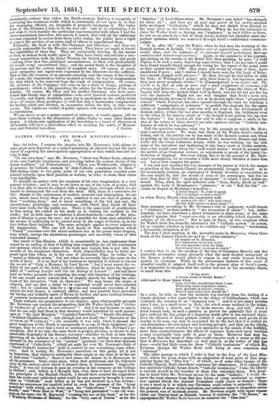Itttrrs 111 flit fhitur.
THE RAILWAY MASSACRE AT RICESTER.
Oxford, 10th September 1851. Sin—It is not long ago that the readers of railway reports were startled by an assertion of Mr. Glyn, the Chairman of the London and North-western Company, to the effect that competition, such as is now being carried on be- tween the great rival lines, was ruinous to the interests of shareholders, and also fraught with danger to the public ; that it was pretty certain ere long to terminate in personal injury, or even sacrifice of life, to those whom busi- ness or pleasure might induce to trust themselves to the tender mercies of iron and steam. I, amongst others, have felt considerable surp 'rise that such a statement did not call forth more indignant comments from the press. Per- haps this omission may have resulted from the utter contempt of all previous warnings and remonstrances, which you, Sir, in common with other editors, have from time to time eloquently addressed to the railway authorities and officials. A more cool and deliberate declaration of a determination, at all risks, in spite of clearly-foreseen and undisguised consequences, to carry on a mortal, struggle with other companies—reckless of murderous results—was surely never promulgated at a public meeting in a civilized country by a person in Xfr. Glyn's position. At the head of a company whose capital and profits are both far superior to those of any railway in the empire, and by which, therefore, we might justly expect that the initiative would be taken in en- deavouring to atop such a disgraceful and sanguinary competition in pursuit of gain, Mr. Glyn announced the fact, that appalling danger did exist—daily, hourly recurring—and, at the same time, asserted that not only were he and his colleagues prepared to continue the system they had begun, but recom- mended and secured the reservation of a large fund out of the divisible profits of the concern, to conduct the campaign with greater vigour ! When a prediction of disaster comes from those who have the power of averting it if they choose, it may be expected speedily' In be verified. Mr. Glyn's has been already verified; and the fearful scene at Bicester last Sa- turday evening—the dead and dying, the maimed and mangled, hurled to- gether in a 'hideous mass amid the debris of carriages and machinery—will not be easily eradicated from the minds of those who witnessed it, much less from the memory of the families and friends of those innocent victims of directorial rapacity. The immediate cause of the engine leaving the rails will never satisfac- torily be discovered. In all probability, it was a mistake of the pointaman, i who n the confusion of the moment, when it was uncertain whether the tram would stop. or not, imperfectly discharged his duty The original cause of the accident Is, fortunately, sufficiently apparent. The train contained a munber of passengers for Bicester, who were expected there by their friends, many of whom were waiting at the station to receive them. The Bicester stationmaster had accordingly calculated upon a stoppage, and his subordi- nates had received the requisite directions. On the first appearance of the train, (which, from a sharp curve, does not come in sight tall close upon the station,) it was evident from its great speed—thirty miles an hour—that there was no intention of stopping. The stationmaster seems promptly to have ordered the danger-signal to be raised, and called to the pointaman, to let the train pass through on the straight line. The time was unfortunately too short to permit of this manceuvre being successfully executed. The en- gine-driver, indeed, instantly shut off the steam, and prepared to do all he could to avoid the catastrophe by reversing his engine. The ,pointsmin at the same time pressed down the handle of the "switch," to allow the train to pass through the station; for, it seems, the ordinary position of the point, was such as to turn the trains upon the siding. In this state the engine went upon the point and proceeded straight forwards. Then the man ap- pears to have let go the handle ; the tongue of the point suddenly. resumed its position, and the rest of the train was of course directed down the other line of rails. The forces were thus made to set in different directions. The coupling-chain, indeed, snapped immediately ; but the jerk threw both the enpne and train off their respective rails, and the mischief was accomplished.. No blame can attach either to the diiver of the train or to the men at the, station. The former, when he started from Bletchley, had received no di- rections to stop at Bicester. The latter had fairly anticipated the stoppage' knowing that passengers were expected by that train, and they had received; no notice, though there is an electric telegraph on the line, that any new' arrangement had been made ; and the suddenness of the whole transaction rendered it impossible to make any alterations in time. The blame attaches either to the conductor of the train, who did not at starting, give the driver proper directions, or to the managing officials at Euston Square and Bletchley. To prove to you, Sir, how they manage matters at head-quarters, I may state what happened to myself a fortnight ago. I went to London by an excursion-train from Oxford, on the Monday, with the option of retitle= on the Wednesday at 11 a. m. At that hour, I went to ETuston Square, .an found a long line of carriages drawn up by the platform. It was a mixed train of excursionists returning to Wolverhampton and other places. I in- quired if it was to take the Oxford passengers. Several porters and police- men were there, and not one of them seemed to know anything definite about it. At last I satisfied myself that it was the train I wanted. But there was only one first-class carriage, and it was full. There were plenty of carriages close by, and plenty of porters to move them ; but they either could not or would not do this without orders from the superintendent. About half-past eleven, that functionary made his appearance; and on my remonstrating with him upon this waste of time, and the further unnecessary delay of add- ing another carriage, which might just as well have been done before, he not very courteously grumbled out, that "at such times as these, with all the extra traffic in consequence of the Exhibition, regularity and punctuality' could not be.expected !" adding, that it was better' to detain a train for half an hour-than allow another-to run into it. Witbout.entering-npon the (11116" ton why a tram should be advertised to start at an imposailde hour Alva&
abundantly evident that either the North-western Railway is incapable of conveying the enormous traffic which is continually forced upon it, or that the managing officials are incapable of properly arranging it. The latter horn of the dilemma I take to be the true one : and in so concluding, I do not wish to treat-harshly the particular superintendent with whom I had the above-mentioned interview, but merely to assert, that with all the additional revenue supposed to accrue from these extra trains, the public have a right to expect the services of an extra staff of officers to superintend them.
Primarily, the filult is with the Chairman and Directors ; and they are morally responsible for the Bicester accident. They know (or ought to know) the capabilities of their line. They are oontinually striving, by fair means or foul, to induce fresh traffic upon it. They have lately entered into a stre- nuous competition with the Great Western for Oxford passengers and goods —taking from that line additional encumbrances, to their own plethorioally (it would seem) encumbered line ; and the grand finale is the slaughter of six persons and the serious injury of numbers more. Of course, as usual, great sympathy and regret were expressed by the Directors for the sufferers. This is like the remorse of an assassin standing over the corpse of his victim. Of course, the shareholders will be mulcted severely, by way of compensation for that which is far removed from the reach of compensation. Of course,, the servants of the Company will come in for a share of blame, perhaps of punishment; which is like punishing the soldier for the blunder or his com- mander. Of course, Mr. Glyn and his brother Directors, who have sanc- tioned this bloody race of competition—who with,fiendish coolness predicted its results, and hoped, doubtless, some day to participate in the unholy fruits of it—of course these gentlemen (r.) will feel only a momentary: compunction for having aided and abetted, as accessories before the fact, in this—nas- SACRE. The righteeus verdict of public opinion will assuredly hold them up to reprobation.
We are never to see a proper control of railways, it would appear, till we have them working in the dominions of Abbas Pasha or some other Eastern despot. A wholesome application of the bowstring to a board of directors at Alexandria will have a marvellous effect in securing the safety of Afussul-



























 Previous page
Previous page